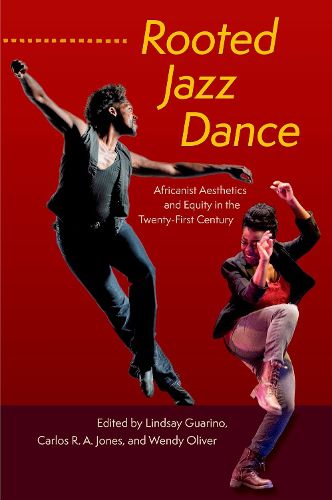Readings Newsletter
Become a Readings Member to make your shopping experience even easier.
Sign in or sign up for free!
You’re not far away from qualifying for FREE standard shipping within Australia
You’ve qualified for FREE standard shipping within Australia
The cart is loading…






This title is printed to order. This book may have been self-published. If so, we cannot guarantee the quality of the content. In the main most books will have gone through the editing process however some may not. We therefore suggest that you be aware of this before ordering this book. If in doubt check either the author or publisher’s details as we are unable to accept any returns unless they are faulty. Please contact us if you have any questions.
An African American art form, jazz dance has an inaccurate historical narrative that often sets Euro-American aesthetics and values at the inception of the jazz dance genealogy. The roots were systemically erased and remain widely marginalized and untaught, and the devaluation of its Africanist origins and lineage has largely gone unchallenged. Decolonizing contemporary jazz dance practice, this book examines the state of jazz dance theory, pedagogy, and choreography in the twenty-first century, recovering and affirming the lifeblood of jazz in Africanist aesthetics and Black American culture.Rooted Jazz Dance brings together jazz dance scholars, practitioners, choreographers, and educators from across the United States and Canada with the goal of changing the course of practice in future generations. Contributors delve into the Africanist elements within jazz dance and discuss the role of Whiteness, including Eurocentric technique and ideology, in marginalizing African American vernacular dance, which has resulted in the prominence of Eurocentric jazz styles and the systemic erosion of the roots. These chapters offer strategies for teaching rooted jazz dance, examples for changing dance curriculums, and artist perspectives on choreographing and performing jazz. Above all, they emphasize the importance of centering Africanist and African American principles, aesthetics, and values.
Arguing that the history of jazz dance is closely tied to the history of racism in the United States, these essays challenge a century of misappropriation and lean in to difficult conversations of reparations for jazz dance. This volume overcomes a major roadblock to racial justice in the dance field by amplifying the people and culture responsible for the jazz language.
$9.00 standard shipping within Australia
FREE standard shipping within Australia for orders over $100.00
Express & International shipping calculated at checkout
This title is printed to order. This book may have been self-published. If so, we cannot guarantee the quality of the content. In the main most books will have gone through the editing process however some may not. We therefore suggest that you be aware of this before ordering this book. If in doubt check either the author or publisher’s details as we are unable to accept any returns unless they are faulty. Please contact us if you have any questions.
An African American art form, jazz dance has an inaccurate historical narrative that often sets Euro-American aesthetics and values at the inception of the jazz dance genealogy. The roots were systemically erased and remain widely marginalized and untaught, and the devaluation of its Africanist origins and lineage has largely gone unchallenged. Decolonizing contemporary jazz dance practice, this book examines the state of jazz dance theory, pedagogy, and choreography in the twenty-first century, recovering and affirming the lifeblood of jazz in Africanist aesthetics and Black American culture.Rooted Jazz Dance brings together jazz dance scholars, practitioners, choreographers, and educators from across the United States and Canada with the goal of changing the course of practice in future generations. Contributors delve into the Africanist elements within jazz dance and discuss the role of Whiteness, including Eurocentric technique and ideology, in marginalizing African American vernacular dance, which has resulted in the prominence of Eurocentric jazz styles and the systemic erosion of the roots. These chapters offer strategies for teaching rooted jazz dance, examples for changing dance curriculums, and artist perspectives on choreographing and performing jazz. Above all, they emphasize the importance of centering Africanist and African American principles, aesthetics, and values.
Arguing that the history of jazz dance is closely tied to the history of racism in the United States, these essays challenge a century of misappropriation and lean in to difficult conversations of reparations for jazz dance. This volume overcomes a major roadblock to racial justice in the dance field by amplifying the people and culture responsible for the jazz language.